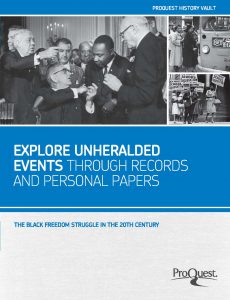
In honor of Black History Month, the UCF Libraries, the Department of History, and the Africana Studies program would like to announce the acquisition of two new African American primary source collections. These are the second of a two-part technology fee proposal. The first phase led to the acquisition of six new databases: Black Abolitionist Papers, Black Thought & Culture, Slavery and Anti-Slavery Transnational Archive, Slavery and the Law, and Slavery in America.
In 2017, we continued building our collection in this important area by acquiring Black Freedom Struggle in the 20th Century. Part of ProQuest’s history Vault, this collection focuses on Federal Government Records, the political side of the freedom movement, the role of civil rights organizations in pushing for civil rights legislation, and the interaction between African Americans and the federal government in the 20th century. Highlights include FBI files from the Kennedy, Johnson, Nixon, Ford, and Reagan administrations, which detail the interaction between civil rights leaders and organizations and the highest levels of the federal government. You can find a more detailed overview of the collection here.
We also acquired the Adam Matthew collection, Race Relations in America Surveys and Papers from The Amistad Research Center, 1943-1970. Based on the Race Relations Department at Fisk University, this collection highlights topics such as poverty and inequality, class, housing, employment, education and government policy. Its program attracted many well-known figures in the Civil Rights Movement, including Thurgood Marshall, Martin Luther King Jr., Bayard Rustin, Charles Houston, and Marguerite Cartwright. More details about Race relations in America can be viewed here.
These collections fill a crucial need for primary source material in the far-ranging field of Africana studies. They’re a treasure trove of unique material that will be invaluable to Africana studies, history, political science, legal studies, literature, art, and more. All of these collections can be accessed via the Africana Studies database page. If you have any questions, please contact John Venecek, the Africana Studies subject librarian.